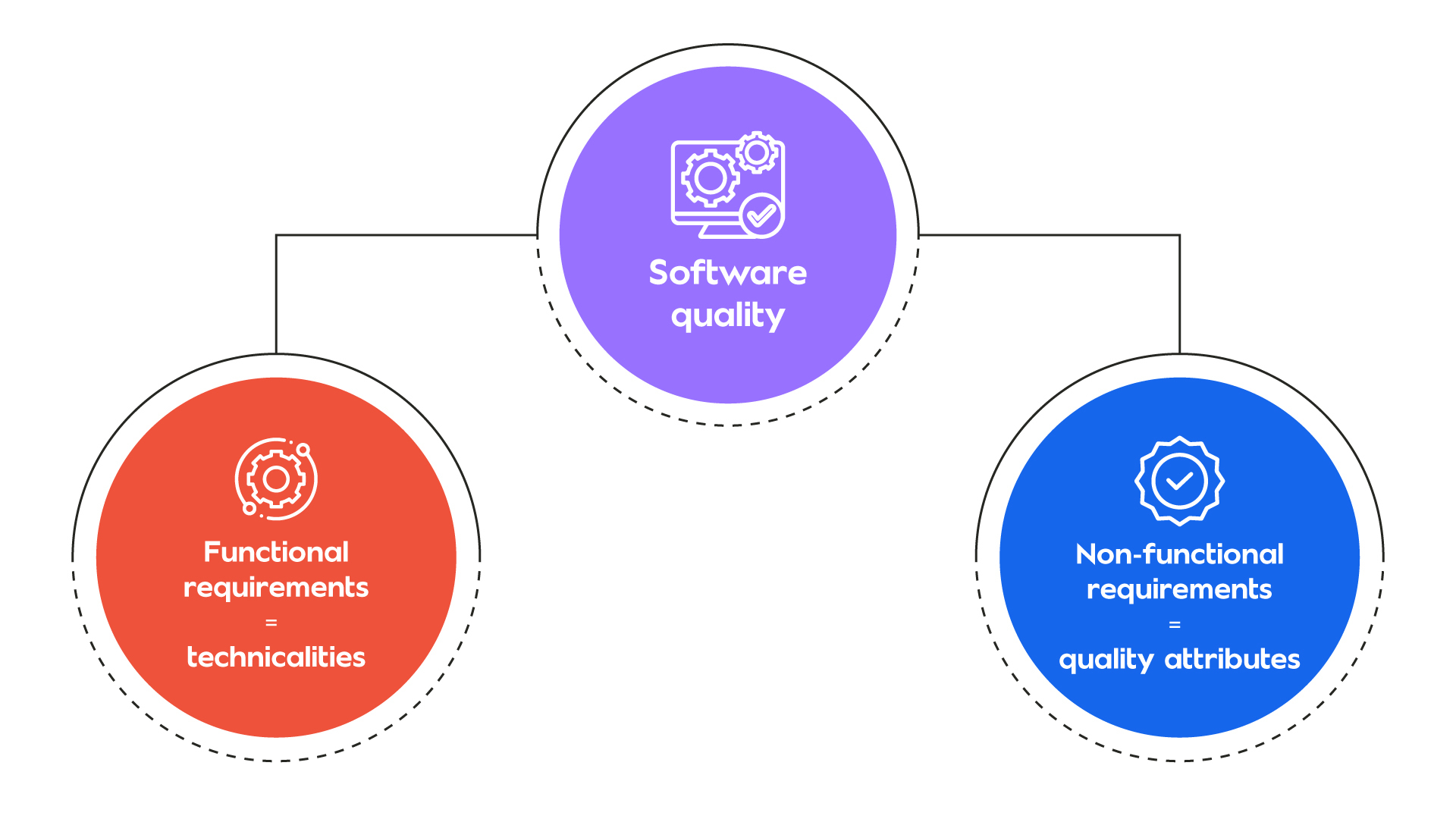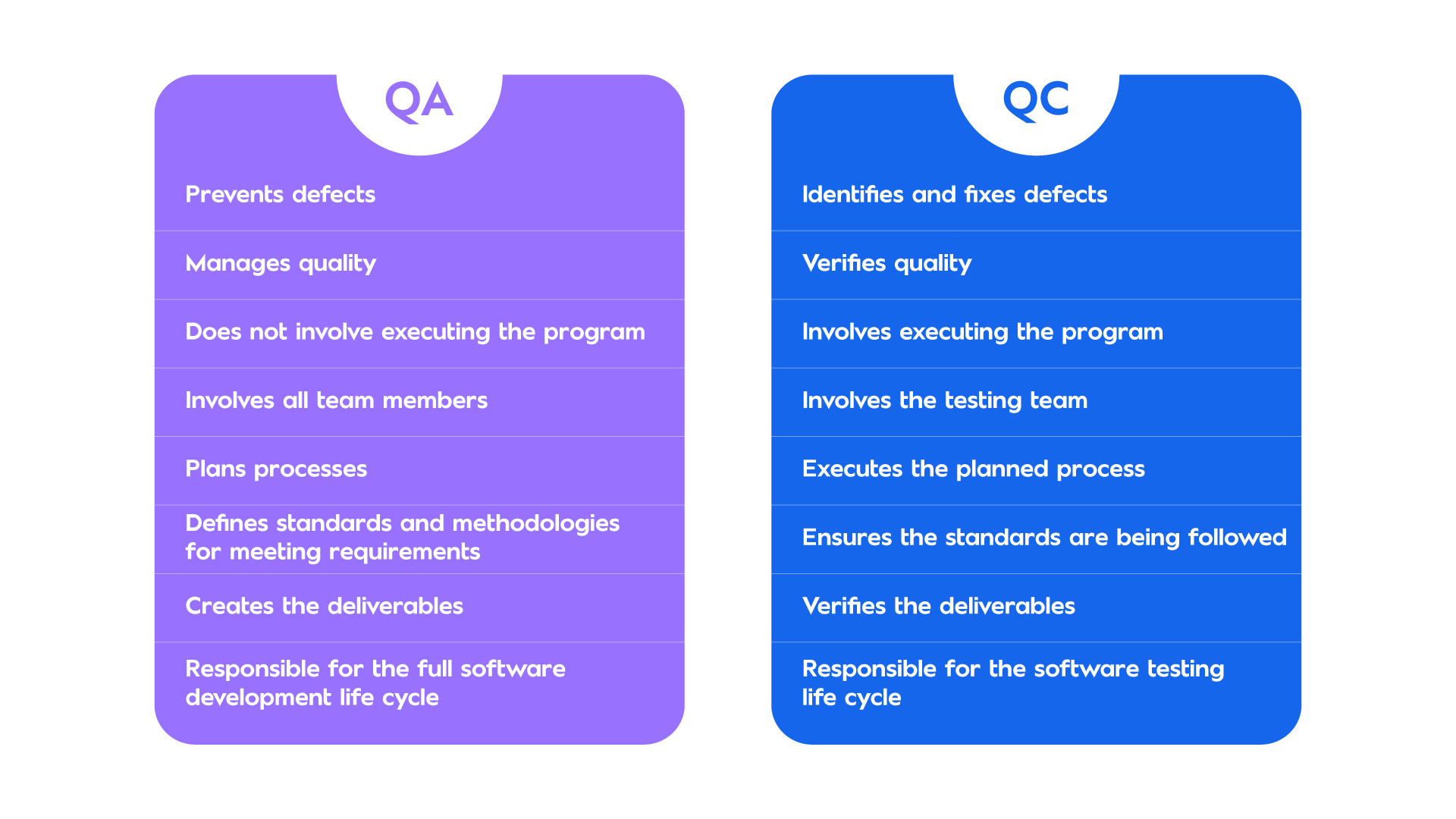There’s only so far your software can get if it’s full of bugs and issues. Even if you’re selling the perfect solution that will help so many people at a very reasonable price, your customer base will end up unsatisfied. That also means you’ll lose money – you won’t have any returning customers, and you’ll be forced to pour all your profits into sorting out the complaints.
But that can be prevented very easily. If you ensure no issues will arise at the users’ end, you’ll save time, money, and energy that you can invest in developing new updates and features. How can you do that? With QA and QC tests, of course!
What is Software Quality?
You can probably guess what software quality means – it answers the question of whether the solution meets all the requirements. Those requirements are typically divided into functional and non-functional ones, which are measured separately.
Functional requirements include what the software does. These are all the technical details that go into creating a solution – calculations, processing, and whatever other functionality is necessary.
Non-functional requirements, AKA quality attributes, are the features defined as how the software works. This includes security, privacy, usability, and other similar aspects.
The functional side of software quality is the bare minimum. Failing to meet these standards means you’ve failed at creating the software, which is why the non-functional requirements are what really define the quality. Most of the aspects you measure should fall into this category.

How to Measure Software Quality?
You can find and closely follow already established models for measuring software quality. However, you also have the option to create your own model comprised of factors you deem the most important. Keep in mind that even if you choose to use an existing model, you’ll most likely have to alter it in some way to fit your specific product.
The most popular method of measuring software quality is the CISQ model. The acronym stands for The Consortium for IT Software Quality, which is the organization behind the idea. Their aim is to make improvements in the software quality industry, and due to their fame and dedication, their test is regarded as the gold standard.
The CISQ method uses the following indicators:
- Reliability: to check off this box, the product must have good data integrity, minimal downtime, and be stable in even the most unexpected conditions.
- Performance efficiency: an efficient product uses resources in a way that minimally affects response times and scalability.
- Security: secure software isn’t prone to data breaches and doesn’t pose a risk to the users’ information.
Maintainability: this refers to how easily your product can be modified, transferred, and adapted.
QA vs. QC – What’s the Difference?
QA (Quality Assurance) and QC (Quality Control) may seem like very similar ideas at first, especially if you’re not from the IT industry. This confusion isn’t unjustified – the difference is that QC is a subset of QA factors. That’s why you’ll often hear someone talk about one while referring to the other.
Here’s a rundown of their main differences.
- Timing – QA is present throughout the entire development lifecycle, from the very onset. QC starts later, when the product is finished, and before it is launched (although the step is typically repeated again after release).
- Teams – QA includes the entirety of an organization, meaning that developers and testers need to work together, and QC teams are designated individuals who specialize in the field.
- Preventing vs. identifying defects – QA’s job is to prevent bugs, but if they do occur, it’s up to QC to identify and fix them in the later stages of development.
- Proactive vs. reactive – QA establishes the framework that helps to prevent issues from occurring, while QC comes in later to test and fix anything that needs fixing.
- Focus - QA focuses on procedures and processes (e.g., documentation), while QC focuses on the end product and its potential issues.
When it comes to the specific activities the two perform, they can be best summarized in this table:

Why Should I Run Tests?
Running QA and QC tests is an essential part of any project, not just because they guarantee customer satisfaction but because the repercussions for skipping them could be detrimental to your company. Most obviously, untested products that hit the market may be full of bugs that lead to crashes, damaging your business’ reputation.
Furthermore, these bugs may also lead to security vulnerabilities, and that’s something you want to avoid at all costs. Not putting your product through the right tests could also cause overwhelming expenses due to the need to fix them after the product’s already been launched. It’s much more time and cost-effective to catch problems early on.
Finally, the worst consequence of a bug in software could be legal issues. Should your product breach compliance standards or disobey any regulation, you may find yourself in a courtroom when you could have just tested your product and skipped the unpleasantries.
How Can Valcon Help?
At Valcon, we’re equipped with not only the finest software development professionals but also the best Testers. Since we understand that every product is different, we offer various kinds of tests:
- Functional, for ensuring your software works as you want it to,
- Integration, for ensuring all the components function together,
- System, for evaluating the performance,
- Acceptance, for ensuring it meets your customer’s criteria,
- Regression, for ensuring changes don’t create issues,
- Performance, including load and stress, for evaluating the scalability.
Book a free consultation, and we’ll answer all your questions!



